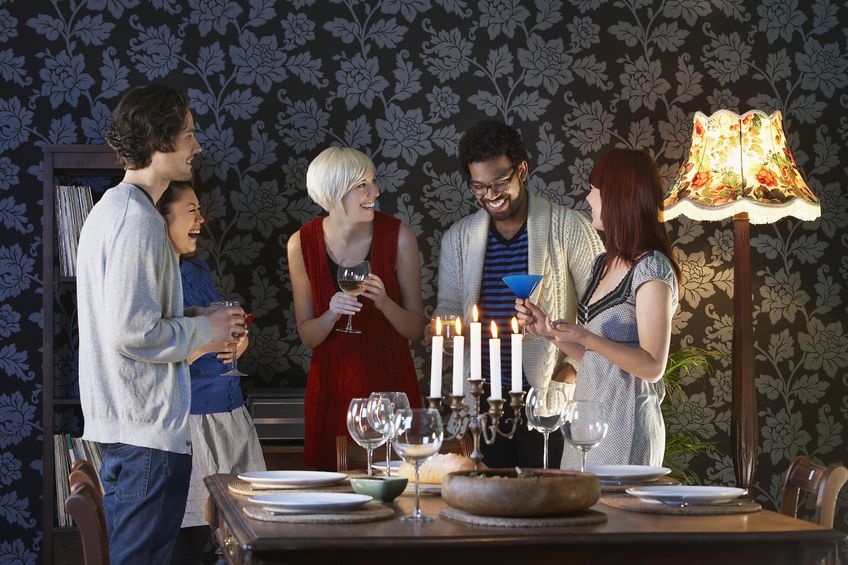The 3 Acts of Dining:
Leaving the Table

As in the other two Acts of Dining, there is a system to leaving the table appropriately. Once again, this is a good time to seek guidance from your "place map" - or table setting.
When dining casually, you may have had a one- or two-course meal, some pleasant conversation, and your fork and knife have been placed in the close-out position on your plate.
At a more formal meal or dinner event, you enjoyed a delicious three- or four-course meal, participated in a toast or two, indulged in a lovely dessert, and notice there are no remaining utensils to be used. In fact, your entire place setting may have been cleared except for a water glass.
Once either of these stopping points are reached, you know this wonderful time is about to end. Except for the one remaining signal.
When your host places his or her napkin on the table, appropriately on the left side of the place setting in the former fork area, it is definitely time to leave. This small act may or may not be prefaced with a final remark ("Thank you for coming," or "It was so terrific to share this occasion with good friends."), but it still remains a signal.
Thus begins Act 3!
Before Leaving the Table
As you were dining, did you notice how delicious the food was? How pleasant the company and conversation? How lovely the table setting?
Before you stand to leave the table, or definitely before you walk out the door, thank your host and offer a gracious compliment. Then, provided your host has given the final signal, place your napkin on the table and follow suit.
If the meal is served in a restaurant and the host is waiting for the check, take the opportunity to say thank you for the invitation, or mention how good the food was. It's also a good time for you to recall the purpose of the occasion.
As a guest, it isn't your responsibility to place your napkin on the table first. I know this may be tempting sometimes, but don't take the lead in leaving. This is the task of the host.
Another act of civility to remember is not to appear bored when you are finished and others are still eating. A bored first finisher may sometimes be recognized as one who pushes himself away from the table or leans back in his chair. Blend in by naturally placing your fork and knife in close-out position and continue participating in the table conversation.
When You'd Rather Be Somewhere Else
Sometimes there is just more fun to be had elsewhere. There's an exciting football game on television, you were invited to another party you'd like to drop in on, or it's been one of those days and you really want to get home to your own couch.
If you truly need to leave early, make sure your host knows ahead of time so she can minimize the interruption. But please, only do this for the right reasons.
On Your Way Out
Napkins are placed on the table and everyone is standing. Remember to slide your chair toward the table so it's not in the way of moving people.
As you exit, say goodbye to other guests as well as your host. This should be a relatively quick process, as you don't want to linger and inconvenience others who are ready to go. Make your last impression a positive one!
Wrapping It Up
Once the occasion is over, send a thank-you note to your host. You can do this first via email, but it is most appropriate to send a handwritten thank-you note within a couple of days after the event. You will be remembered as someone who has an attitude of gratitude.
And don't forget to follow up with anyone else in attendance whom you promised information or further conversation. Many such occasions foster new friendships.
In every act of dining, there are duties for hosts and guests. Hosts are the directors of the event, leading the way by making everyone at ease and entertaining with grace. Hosts also provide the verbal and non-verbal cues to keep things moving along in an orderly fashion.
Guests are gracious attendees and full participants in the occasion offering pleasant conversation, a cooperative and positive attitude, and a showing of gratitude.
When the host and guests demonstrate proper dining etiquette and protocol, their combined hospitalities will have put others as ease, and everyone will depart satisfied and happy with the successful occasion.














